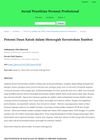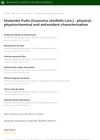 August 2023 in “International journal of experimental research and review”
August 2023 in “International journal of experimental research and review” There are effective treatments available for baldness.

Cold-pressed rapeseed oil is most resistant to oxidation and certain oils may reduce chronic disease risk; consumers like the taste of pumpkin oil best.

Plant-based compounds can improve wound dressings and skin medication delivery.
 July 2023 in “International Journal of Cosmetic Science”
July 2023 in “International Journal of Cosmetic Science” Biopolymers are increasingly used in cosmetics for their non-toxicity and skin benefits, with future biotech advancements likely to expand their applications.
 May 2023 in “Scientific Reports”
May 2023 in “Scientific Reports” The seed extract of Lepidium sativum L. can potentially treat hair loss, showing effects similar to 5% minoxidil.
 January 2023 in “Fashion and textiles”
January 2023 in “Fashion and textiles” Cationic and nonionic surfactants provide better color intensity and resistance for semi-permanent hair dye than anionic surfactants.
 May 2022 in “Maǧallaẗ Buḥūṯ Al-Tarbiyyaẗ Al-Nawʿiyyaẗ (Print)”
May 2022 in “Maǧallaẗ Buḥūṯ Al-Tarbiyyaẗ Al-Nawʿiyyaẗ (Print)” Eating a high inositol diet significantly improves insulin resistance and hormone levels in women with PCOS.
September 2020 in “Pharmauho/Pharmauho : Jurnal Farmasi, Sains dan Kesehatan” The hair tonics with galangal and Aloe vera extracts were stable and met standards.
 May 2020 in “Jurnal Penelitian Perawat Profesional”
May 2020 in “Jurnal Penelitian Perawat Profesional” Katuk leaves may help prevent hair loss.
 May 2020 in “Research, Society and Development”
May 2020 in “Research, Society and Development” Mutamba fruits are rich in soluble solids, vitamin C, and minerals, making them good for food industry use.
 January 2020 in “Medical journal of Dr. D.Y. Patil Vidyapeeth”
January 2020 in “Medical journal of Dr. D.Y. Patil Vidyapeeth” Indian women with skin signs of high male hormones often have related health issues.
November 2019 in “BMC veterinary research” The hair loss in Belgian Blue crossbred calves was caused by a diet issue, not by disease or infection.
January 2019 in “Springer eBooks” Combination therapies might work better for some vitiligo patients, but results vary.
 January 2019 in “Journal of Dermatology and Venereology”
January 2019 in “Journal of Dermatology and Venereology” Sesame and pumpkin seed oil can effectively regrow hair in alopecia areata.
 April 2011 in “한국생물공학회 학술대회”
April 2011 in “한국생물공학회 학술대회” Lotion with fucoidan from brown seaweed improved skin and reduced allergy symptoms in mice with dermatitis.
 November 2016 in “Zoo biology”
November 2016 in “Zoo biology” Adding more vegetables and fruits improved capybaras' coat quality and health.
 12 citations,
November 2017 in “Archives of Dermatological Research”
12 citations,
November 2017 in “Archives of Dermatological Research” Mediterranean diet with fresh herbs and vegetables lowers male hair loss risk.
January 2018 in “Journal of Food Biosciences and Technology” Garlic and fenugreek may help treat hair loss.
 46 citations,
August 2016 in “Journal of The American Academy of Dermatology”
46 citations,
August 2016 in “Journal of The American Academy of Dermatology” The study found that family history, personal history of adolescent acne, no pregnancies, hirsutism, office work, stress, and low intake of fruits/vegetables and fish are risk factors for adult female acne.
 9 citations,
June 2021 in “Nutrients”
9 citations,
June 2021 in “Nutrients” Fisetin in fruits and vegetables helps hair growth in mice.
 January 2023 in “International journal of advances in scientific research and engineering”
January 2023 in “International journal of advances in scientific research and engineering” Anthocyanins from fruits and vegetables may help prevent and treat colorectal cancer safely.
January 2021 in “Agrobiological records” Biofortifying fruits and vegetables with selenium can improve dietary intake and prevent health issues.
 March 2024 in “Current materials science”
March 2024 in “Current materials science” Fisetin, found in fruits and vegetables, may help treat various health conditions like inflammation, diabetes, heart issues, cancer, and hair loss.
 January 2024 in “Biological & clinical sciences research journal”
January 2024 in “Biological & clinical sciences research journal” Apigenin, found in plants and vegetables, has many health benefits, including anti-inflammatory, antioxidant, and anticancer effects.
 138 citations,
July 2015 in “Clinical, Cosmetic and Investigational Dermatology”
138 citations,
July 2015 in “Clinical, Cosmetic and Investigational Dermatology” Eating less sugar, milk, and saturated fats and more vegetables and fish may help treat and prevent acne.
 April 2019 in “Journal of Investigative Dermatology”
April 2019 in “Journal of Investigative Dermatology” Many patients with autoimmune blistering skin disorders change their diets, avoiding foods like alcohol, citrus, and spices, and some find vegetables and dairy helpful.

research Acne
4 citations,
January 2019 Acne is a common skin condition that can be influenced by diet, lifestyle, and hormones, and requires a treatment approach that includes psychological considerations.
 January 2025 in “Journal of Cosmetic Dermatology”
January 2025 in “Journal of Cosmetic Dermatology” This study investigated the relationship between nutrition habits, BMI, and psychoemotional status in 100 patients with seborrheic dermatitis (SD) compared to 110 healthy controls. The findings revealed that the severity of SD was positively correlated with higher BMI and poor nutrition habits, such as increased consumption of bread, margarine, animal fat, and sugar, and decreased intake of fruits and vegetables. Additionally, patients with SD had lower scores on the Adolescents Food Habits Checklist and higher scores on the Depression Anxiety Stress Scale‐21, indicating worse psychoemotional status. The study concludes that poor nutrition habits, higher BMI, and negative psychoemotional status may contribute to the development and worsening of SD, suggesting that healthy nutrition and improved psychoemotional well-being could help prevent or mitigate the condition.
 January 2022 in “Clinical Cases in Dermatology”
January 2022 in “Clinical Cases in Dermatology” Lack of certain nutrients may contribute to hair loss and proper diet or supplements could improve it.
 6 citations,
December 2022 in “Frontiers in Pharmacology”
6 citations,
December 2022 in “Frontiers in Pharmacology” Quercetin may help improve symptoms of polycystic ovary syndrome.

























